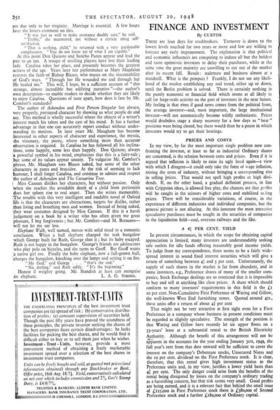FINANCE AND INVESTMENT
By CUSTOS
THESE are lean days for stockbrokers. Turnover is down to the lowest levels touched for two years or more and few are willing to forecast any early itnprovement. The aplanation is that political and economic influenCeS are conspiring to induce all but the boldest and most optimistic investors to delay their purchases, while at the same time the great majority are unwilling to cut out of the market after its recent fall. Result : stalemate and business almost at a standstill. What is the prospect ? Frankly, I do not see any likeli- hood of the market establishing any real trend, either up or down, until the Berlin problem is solved. There is certainly nothing in the purely economic or financial field which seems at all likely to call for large-scale activity on the part of investors in the near future. My feeling is that e'Ven if good news comes from the political front, the average investor—and, most important, the large institutional investor—will not automatically become wildly enthusiastic. Prices would doubtless stage a sharp recovery for a few days as " bear " positions were being closed, but there would then be a pause in which investors would try to get their bearings.
PRICES AND COSTS
In my view, by far the most important single problem now con- fronting the investor, at least so far as industrial Ordinary shares are concerned, is the relation between costs and prices. Even if it is argued that inflation is likely to raise its ugly head again—a view with which I disagree—it could only take the form of wage inflation, raising the costs of industry, without bringing a corresponding rise in selling knees. That would not spell high profits or high divi- dends. If, on the other hand, a gradual deflation' process, in line with Crippsian ideas, is allowed free play, the chances are that profits will be caught in the scissors of higher costs and stabilised se_ling prices. There will be considerable variations, of course, in the experience of different industries and individual companies, but the general picture is not alluring. At this juncture the most attractive speculative purchases must be sought in the securities of companies in the liquidation field—coal, overseas railways and the like.
A 4f PER CENT. YIELD
In present circumstances, in which the scope for obtaining capital appreciation is limited, many investors are understandably seeking safe outlets for idle funds offering reasonably good income yields. To judge from my correspondence, there seems to be a fairly wide- spread interest in sound fixed interest securities which will give a return of something between 41 and 5 per cent. Unfortunately, the supply of such shares in the market is far from abundant, and in some instances, e.g., Preference shares of many of the smaller com- panies, Stock Exchange dealings are so restricted that it is impossible to buy and sell at anything like close prices. A share which should conform to many investors' requirements in this field is the LI ro per cent. Non-Cumulative First Preference of Waring and Gillow, the well-known West End furnishing stores. Quoted around 42s., these units offer a return of about 4.1 per cent That might not be very attractive at first sight even for a First Preference in a company whose business in present conditions must be regarded as slightly speculative. The strength of the position is that Waring and Gillow have recently let six upper floors on a 33-years' lease at a substantial rental to the British Electricity Authority. Although the benefit of this arrangement will not be apparent in the accounts for the year ending January 31st, 1949, the full year's rent from that date onward will be sufficient to cover the interest on the company's Debenture stocks, Unsecured Notes and the to per cent, dividend on the First Preference stock. It is clear, therefore, that this rental gives high investment status to the Preference units and, in my view,.justifies a lower yield basis than 41 per cent. The only danger could arise from the benefits of the rental being dissipated by losses on the company's ordinary trading as a furnishing concern, but that risk seems very small. Good profits are being earned, and it is a relevant fact that behind the small issue of L125,000 in First Preference stock there is £380poo of Second Preference stock and a further £18o,000 of Ordinary capital.


































 Previous page
Previous page